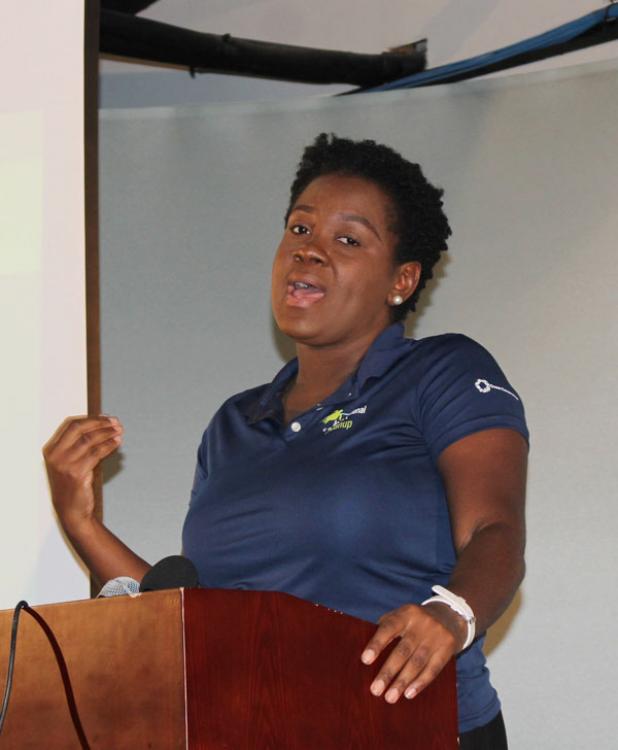
Sade Deane, National Coordinator of the Barbados Chapter of the Caribbean Youth Environment Network, speaking yesterday morning.
Plastics challenge
Between 2015 and 2019, through the Barbados International Coastal Cleanup (BICC) around 175 000 pieces of marine debris were collected from scores of coastal sites and six underwater sites.
That’s according to Sade Deane, National Coordinator of the Barbados Chapter of the Caribbean Youth Environment Network (CYEN). She said that was the total at the end of September 2019, but it is likely to increase by year end, as other cleanups will take place. However, with the ban on certain plastics, she is suggesting that over the next two to five years, there could be a reduction in the number of plastics being found on our beaches.
She made the comments yesterday morning while speaking at the launch of the international Clean Seas Campaign here in Barbados, at the office of the Caribbean Media Corporation. During her address, she indicated that CYEN has also been able to conduct cleanups on some 50 local beaches over the past five years, accounting for 70 percent of the beaches in this country.
Speaking more to the BICC data collection exercise, Deane said it is a valuable one, but also an expensive one to undertake. She explained that the basic cost of pursuing the venture is approximately $65,000 per year. In that respect, she said there is need for more support in this area, both monetary and in-kind.
“Not only before and during the cleanup, but actually after the cleanup, when we’ve gotten such a tremendous amount of information that we would like to share with non-participants especially, and non-stakeholders,” she indicated.
Meanwhile, breaking down the data, she explained that among the top ten debris items of concern locally, are microplastics totalling 30 940; plastic bottle caps of which 23 511 were collected; plastic beverage bottles totalling 12 526 and metal bottle caps of which 12 404 were collected. She said these items were among the top ones found during the cleanup exercises carried out in the last five years under the BICC umbrella.
“It suggests definitely it is a lot of drinking and eating, but more drinking than eating is happening on the beaches and of course, even though with certain things in place, such as the bottle act, we still have some plastic beverage bottles definitely being left,” she said.
Deane added that plastic straws and stirrers, while widely used as one of the campaign leaders in the fight against plastics, came in at number ten, with some 3 817 of those items being collected. She further noted that plastic bags, though of concern, did not make the top ten over the last five years, though it was in the top 20 items of concern. (JRT)
